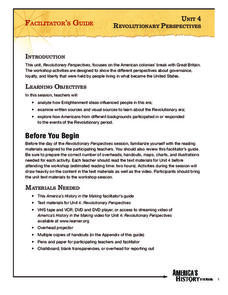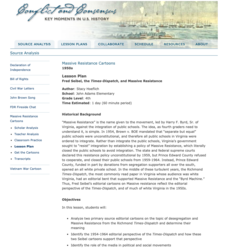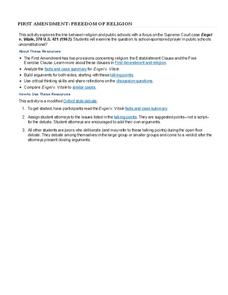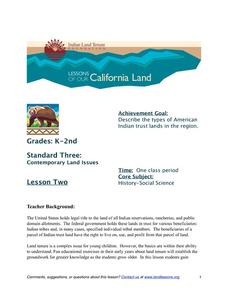Delegation of the European Union to the United States
The European Union’s Economic and Monetary Union
What are the benefits of using the Euro, the EU's common currency? What are the challenges faced? As their examination of the European Union continues, class members investigate the impact on how the switch to the Euro impacted...
PBS
Using Primary Sources: Nazi Spy Ring Busted
Spy games are not just for professionals anymore! Scholars use short video clips, primary documents, and photographs to investigate Nazi spies in America during World War II. The young detectives analyze the paranoia warfare can create...
Stockton University Wordpress
Civil Disobedience: Is it ever ok to break the law?
As part of a study of civil disobedience, class members read excerpts from the writings of activists who were willing to break the law to protest unjust laws.
Constitutional Rights Foundation
Conservation, Preservation, and the National Parks
Going green? Scholars investigate the creation of the US National Park program. Through diary entries as well as expert testimony, they synthesize information and analyze the need for conservation and preservation. Finally, they display...
Constitutional Rights Foundation
The Cold War: How Did It Start? How Did It End?
What is the difference between a Cold War and a Hot War? Scholars research the beginning of the Cold War. They analyze diary entries as well as excerpts from various events during the 45-year standoff. To finish, they prepare final...
Center for Instruction, Technology, & Innovation
Did African American Lives Improve After Slavery?
The Civil War made slavery illegal, but all ex-slaves were not totally free. Scholars visit eight different classroom stations to uncover life during the Reconstruction Era in America. Groups discover items such as Black Codes, 13th,...
Annenberg Foundation
Revolutionary Perspectives
Life, liberty, and the pursuit of happiness. Learners go to the heart of the causes of the American Revolution. Examining political cartoons, Enlightenment documents, and firsthand accounts, they present their ideas and reflective...
Women in World History Curriculum
Women and Confucianism
Young historians consider the far-reaching effects of traditional teachings on the debates about the current attitudes toward women in society. The discussion begins with a list of New-Confucian sayings and expands to a global perspective.
Roy Rosenzweig Center for History and New Media
Fred Seibel, the Times-Dispatch, and Massive Resistance
A lesson challenges scholars to analyze editorial cartoons created by Fred Seibel, illustrator for the Times-Dispatch, during the Massive Resistance. A class discussion looking at today's editorial pages and Jim Crow Laws leads the way...
Roy Rosenzweig Center for History and New Media
Founding Documents
Teach the class about the predecessor to Declaration of Independence—the Virginia Declaration of Rights. Using the foundational documents, scholars examine the two writings to consider how they are similar and how they are different. A...
Alabama Department of Archives and History
Alabama Slave Codes in 1833: What They Can Teach Us About Slaves Themselves
After viewing a short PowerPoint about Nat Turner's rebellion, class groups examine Alabama's 1833 slave codes. Individuals then develop a mini-legal brief arguing against one particular slave law.
Administrative Office of the US Courts
Engel v. Vitale
"Is school-sponsored prayer in public schools unconstitutional?" That is the question teams debate as they consider the arguments presented to the Supreme Court in Engel v. Vitale. The attorneys study the provided talking points and...
Alabama Department of Archives and History
Marketing a Bad Idea: Why So Many People Joined the Klan in the 1920s
How did the Klu Klux Klan manage to gain so many members during the 1920s? Class members examine Klan documents and promotional materials to gain an understanding of the propaganda techniques used to attract members.
Japan Society
Japan in the World Since 1945
What have US-Japanese relations been like since the conclusion of World War II? Why do some commentators identify Japan's postwar years as a subordinate independence? Invite your young historians to research Japan's status in the world...
K12 Reader
Biography of Abraham Lincoln
One skill essential to reading comprehension, is learning how to summarize a text. After reading a biography of Abraham Lincoln, readers demonstrate this ability by crafting a brief summary of Lincoln's life.
Indian Land Tenure Foundation
Indian Trust Lands
An important aspect of studying Native American history is understanding the nature of trust lands. Budding historians will learn that as Native Americans were removed from their home lands, trust lands were provided in the form of...
Smarter Balanced
Aztec Empire
To set the stage for a study of the Aztec Empire, groups use the provided definition of civilization and generate a list of elements that make up our modern day civilization. The whole class then examines an image of an Aztec city and...
Other popular searches
- Local and State Government
- Georgia State Government
- Washington State Government
- State Government Missouri
- New York State Government
- Ohio State Government
- Nc State Government
- Texas State Government
- New Jersey State Government
- Oregon State Government
- Illinois State Government
- State Government Branches


















